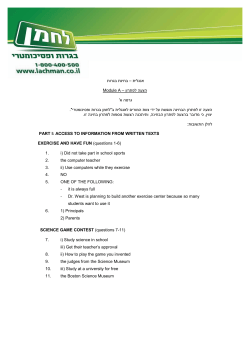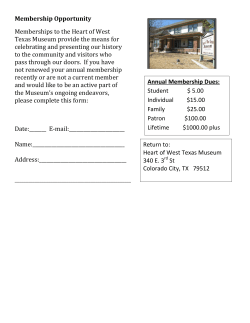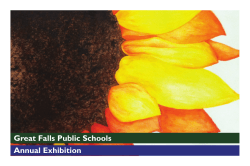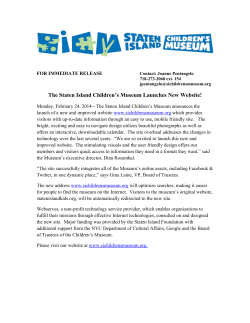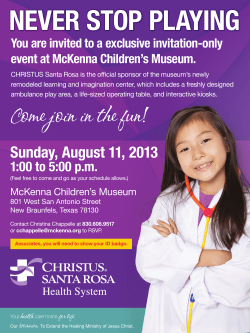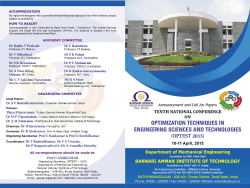
Guidance Notes - Balkan Museums Network
CHwB Small Project Grants Guidance Notes Hints and Tips on completing the application form Introduction This document has been put together based on the experience of the assessors and advisers at CHwB. We hope it will help you fill in your grant application. There are some general hints followed by information related to each section of the grant application form. General advice Do Start early! Read the whole form and these notes fully before you start. Remember we are always pleased to offer advice and support. If you are not sure whether your project, or some of the costs involved, is feasible, or whether it could be funded, contact us. Think about presentation – for example using bullet points rather than narrative text. Complete all the boxes. If anything is not clear, or you need help, contact us. Have your finished application proof read by someone who has not seen it before. Think about the application from the assessor's point of view. Is it clear? Is it concise? Use a separate sheet of paper if you run out of space when completing the form. Put the section number at the top of the extra page, so we know to what it refers. Don’t Don’t assume we know anything about your project. Write it as though it will be read and assessed by someone who is coming across the project for the first time. 1 The Application Form Your organisation We need this information so that we can keep in touch with you. We also need to know about your Museum so that we can understand more about how the project might work. So please make sure this information is accurate and up to date. It is your responsibility to notify us of any changes. (Questions 1-7). Your project Short descriptive title (Question 8) A word or phrase that sums up what the project aims to do and which we can all use when we refer to the project. We will use this on our website and for public communication. When will your project take place? (Question 9) Give us the first and last dates of project activity. Be realistic. The project should idealistically run from 1st June – 8th December 2014. This project develops (please tick all that apply) (Question 10) We want to know which broad categories your project fits into so tick all the boxes that describe aspects of your project. Please note that there is a special award of up to €8.000 for a regional project that involves minimum three partner museums. 2 Please provide the description of your project (what problem(s) are you solving, what is the methodology of implementation, who will benefit from this project). (Question 11) The project is designed to contribute to solution of some difficult situation either in the museum itself or its community. Give brief description what is the problem, how big it is and how you plan to contribute to its solution. Some of implementation methodologies are educational activities, networking with partner organization or media promotion activities. List the groups that will benefit the most from the project. For example young people from 14-20 years of age. What are the objectives of your project? (Question 12) These are the specific things you will achieve. An objective is a description of an intended outcome, written in specific terms. What you will do. By when. To what standard. How you will know you’ve done it. Please list the main results of your project. (Question 13) Results are tangible deliverables (such as the new infrastructure) or new services. Results of the project are also increased knowledge and awareness about an issue. Results are direct output of your project. Who will deliver this project (please tick all that apply)? (Question 14) Please include anyone who will be involved in delivering the project Please describe how you will involve marginalised and / or community groups in your project. (Question 15) Be as specific as you can about how you are consulting with marginalized groups (such as disabled people) and how they are going to be involved in an on-going way with the project. 3 Evaluating your Project Describe how you are going to evaluate your project (Question 16) What methods will you use to find out if your project is successful or not? How will you find out about the experience of people who take part in the project? How will you document anything you learn as you deliver the project? This is important because it will support you to improve your practice in the future. Describe how you plan to disseminate learning outcomes from the project to staff colleagues and volunteers (Question 17) We would like this project to have a wider impact so we are interested to know how you will tell others about your experience, what worked and what didn’t and what you might do differently next time. How will you tell others in your museum? How will you tell people working in other museums? Describe how you plan to disseminate learning outcomes from the project to colleagues at other museums(Question 18) Project costs Direct costs These are the costs of your activities such as workshops, exhibition, campaign, etc. This is part should be at least 80% of the budget. Please note the costs that CHwB will not fund (see the Call for Proposals). We need as much detail as you can give us. Try not to forget anything. Operational costs These are costs of staff and institutions involved in the implementation of the action. You can also include communication costs as well as percentage of utilities, if it can be justified with the type of activities you are proposing. 4 This is the whole figure, everything you will have to spend to deliver the project except staff costs. Salaries of staff cannot be covered. Total cost of the project (Question 19) Total grant applied for (Question 20) Please note: Maximum available from CHwB is How much are you asking CHwB for? € 3.000 If you are asking CHwB for less than the whole Please describe how you will raise the remaining project costs, if there is a difference project cost, how will you raise the rest? For example, do you have another grant, or will it in the two figures above (Question 21) come from the museum budget? Declaration We need someone at Director or Assistant Director level to approve this application. This shows that the project has support in the organisation. Remember – If you have any concerns or questions, do not hesitate to contact us via info@bmuseums.net 5
© Copyright 2025
